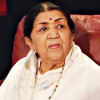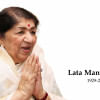Lata Mangeshkar no more
Legendary singer Lata Mangeshkar passed away today at the age of 92, her sister Usha Mangeshkar said.
She was admitted to a hospital in early January this year, after she tested positive for Covid-19 and was also diagnosed with pneumonia. Lata Mangeshkar was admitted to the ICU with mild symptoms and was recovering slowly, according to Times of India.
Around January 28, the singer was taken off the ventilator, after she showed slight signs of improvement. However, on February 5, her condition deteriorated and she was back on ventilator support. Since her condition was critical, the veteran singer was put under aggressive therapy and was tolerating the procedures before her unfortunate demise.
"Lata Didi's songs brought out a variety of emotions. She closely witnessed the transitions of the Indian film world for decades. Beyond films, she was always passionate about India's growth. She always wanted to see a strong and developed India," tweeted Indian Prime Minister Narendra Modi.
Several celebrities, including A R Rahman, Akshay Kumar, Manoj Bajpayee, Ajay Devgn, and Kajol among others, took to social media to pay their last tributes to the singer.
Love, respect and prayers @mangeshkarlata pic.twitter.com/PpJb1AdUdc
— A.R.Rahman (@arrahman) February 6, 2022
Meri Awaaz Hi Pehchaan Hain, Gar Yaad Rahe…and how can one forget such a voice!
Deeply saddened by the passing away of Lata Mangeshkar ji, my sincere condolences and prayers. Om Shanti— Akshay Kumar (@akshaykumar) February 6, 2022
An icon forever. I will always savour the legacy of her songs. How fortunate were we to have grown up listening to Lataji's songs. Om Shanti. My deepest condolences to the Mangeshkar family
— Ajay Devgn (@ajaydevgn) February 6, 2022
A golden era of music world has truly ended!! Lata Ji you will be missed by millions of us & the generations coming after us!! Rest in peace!! #RIPLATAJI ॐ शान्ति
— manoj bajpayee (@BajpayeeManoj) February 6, 2022
India declared a two-day national mourning following death of Lata Mangeshkar and the national flag would fly at half mast, according to reports.
Lata Mangeshkar was born on September 28, 1929 to Marathi musician Pandit Deenanath Mangeshkar and Shevanti in Indore. She was the oldest of the siblings, Meena Khadikar, Asha Bhosle, Usha Mangeshkar and Hridaynath Mangeshkar.
At birth, Lata Mangeshkar was named Hema but rechristened later after a famous character Latika from her father's play 'Bhaaw Bandhan'.
Before making a mark as a singer, Lata Mangeshkar had faced the camera as an actress. Her father passed away when she was 13 and the famous songstress took charge of her family and worked in over eight films from 1942 to 1948. With little success in acting, Lata Mangeshkar went on to make a career in singing.
Lata Mangeshkar took keen interest in singing and had studied fine art of music with Aman Ali Khan Sahib and Amanat Khan, celebrated singers of her time. She had also received music lessons from her father.
Known as the 'Nightingale of India', Lata Mangeshkar's debut song 'Nachu Yaa Gade, Khelu Saari Mani Haus Bhaari' for Marathi film 'Kiti Hasaal' (1942) was dropped from the final cut of the film. She was initially rejected as a playback singer but later on she went on to deliver some of the biggest hits of the industry and will be fondly remembered for her massive contribution to the music industry.
She was the music director for five films and had produced four movies out of which three were Hind films - 'Jaanjhar' (1953), 'Kanchan Ganga' (1955) and 'Lekin...' (1990) which bagged several National Awards.
Lata Mangeshkar's rendition of 'Aye Mere Watan Ke Logon, Zara Aankh Me Bhar Lo Pani' moved India's first Prime Minister Jawaharlal Nehru to tears in 1962.
She was also the first Indian to have performed at the Royal Albert Hall, London in 1974.
Lata Mangeshkar's song 'Tere Sang Pyar Main' from 'Nagin' (1976) and 'Wada Na Tod' from 'Dil Tujhko Diya' (1987) were used as a background score in Jim Carrey starrer 'Eternal Sunshine of The Spotless Mind' (2004).
Lata Mangeshkar was a recipient of the Padma Bhushan, third-highest civilian award in 1969, the Padma Vibhushan, second-highest civilian award in 1999 and the highest civilian award, Bharat Ratna in 2001.
Lata Mangeshkar was also conferred with France's highest civilian award, 'Officier de la Legion d'Honneur' (Officer of the Legion of Honour) in 2009.
She received three National Awards for the songs 'Beeti Na Bitai Raina' from 'Parichay' (1972), 'Roothe Roothe Piya' from 'Kora Kagaz' (1974) and 'Yara Seeli Seeli' from 'Lekin...' (1991).

 For all latest news, follow The Daily Star's Google News channel.
For all latest news, follow The Daily Star's Google News channel. 








Comments